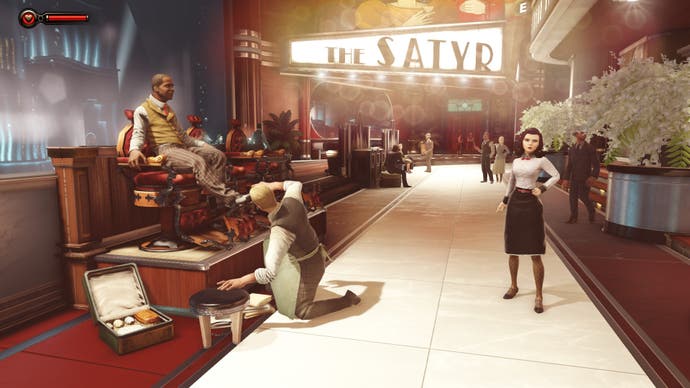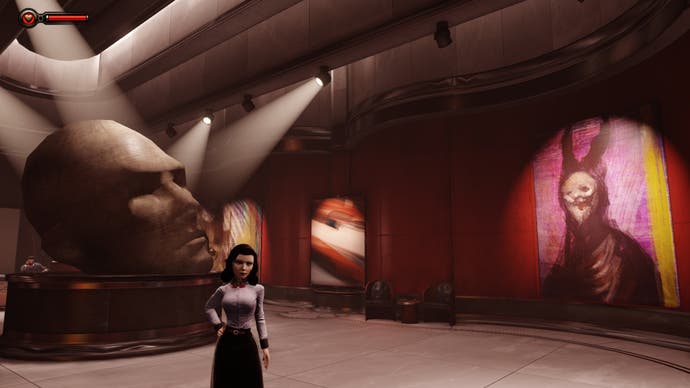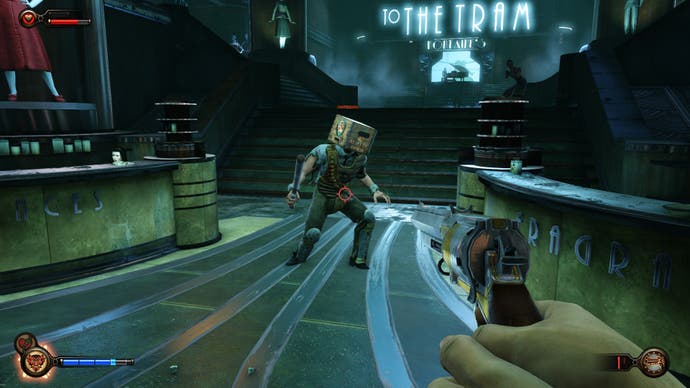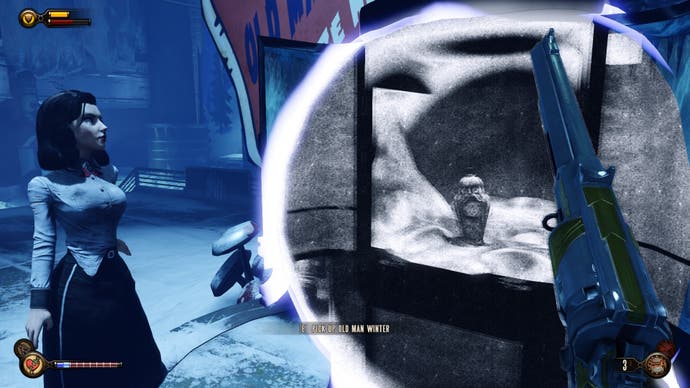BioShock Infinite: Burial at Sea - Episode One review
Wave race.
Constants and variables. BioShock Infinite's first story add-on does a staggering job of weaving a vivid and memorable tale around these core concepts. Irrational has had tremendous fun with the notion of taking characters with whom we are familiar and transporting them to a time and place that we have only imagined - Rapture, the undersea city from the first two BioShock games, before its explosive fall.
It's compelling to look in on Infinite's Booker and Elizabeth, a pair we know to be inextricably tied and yet who appear here as relative strangers. It's exciting to guide them through surroundings to which they are connected but do not belong. Throughout the opening act of Episode One's 150-minute run-time, Irrational serves up a cornucopia of references to Rapture's most evocative themes, places and characters, spinning variables around the many constants that we believe to be fixed.
This opening also serves to highlight the myriad ways in which Rapture is the inverse of Infinite's skybound setting, Columbia: from the crushing black of its horizon to the false freedom of its societal ideals; from Booker's transformation into one of Rapture's own to Elizabeth waltzing into his office with talk of jobs and debts before leading purposefully from the front, rather than following timidly behind. As the constants and variables coalesce time and again, it's a delight to sit outside of it and observe, to pick at the many threads of BioShock's richly woven fiction.

These opening 30 minutes are crucial to your enjoyment of Burial at Sea. If you wish to take the time to drink in the atmosphere and the wonder of Rapture, then Irrational has included much that will make you smile. It feels like a spectacular and elaborate show staged just for you, and all it asks in return is that you sit back and accept that, even here, Rapture is not quite truly alive. Its citizens stand around in perpetuity, waiting for you to draw near and trigger knowing dialogue. A spliced Houdini waiter deliberately bars your passage so he can wow you with his party trick. The lengths to which you can wander are limited by essential maintenance, refused admittance or necessary convenience.
This is Rapture as a museum exhibit, then: evocative, awe-inspiring and semi-sacred, but largely out of reach and certainly not meant for extensive handling. Too soon, it ends. Finding a key to unlock a door to go in search of a girl named Sally brings the Glory of Rapture section of the tour to a close. Aware that you might be expecting more, Irrational makes sure to flag up the fact that once you cross the threshold to meet with a familiar face, there's no going back for a second viewing. The ride ends here, follow the signs to the exit, no re-admittance allowed.
Beyond this point, Booker and Elizabeth are plunged into the depths of Rapture, where spliced-up former residents roam an abandoned shopping precinct, where lights are few and leaks are plentiful. This is the Rapture of old, a shadow of the city above, with a tone more in keeping with our first visit here back in 2007. It's also where Burial at Sea, the game, begins proper.

The search for Sally takes place throughout a former business premises of Frank Fontaine's that Rapture's architect Andrew Ryan sabotaged and sank as part of the rivals' bitter feud. It's here that the lead characters revert to the relationship with which we are familiar, with Elizabeth often out of shot as Booker takes the lead, wielding weapon and vigor (although here they're described as "drinkable plasmids" for reasons explained through Dr Suchong's scattered audio logs).
Ammo is scarce and Booker starts with only the Devil's Kiss and Possession vigors, which lends a more considered approach to combat as the game urges you to make the most of the vigors' alternate fire modes to set traps and to pick off lone Splicers, rather than charge in all guns blazing. Elizabeth is still on hand with the occasional replenishing pick-up, but the general lack of resources and dearth of rubbish bins to ransack is a clear indication that a more cautious approach is advised.
It's an interesting change of pace that makes combat feel more meaningful. Occasionally, you're forced to take on a gaggle of Splicers while Elizabeth struggles to pick a lock, or in order to win possession of a new vigor, and here the lack of resources injects tension during the brawl and a feeling of relief afterwards.

While Booker and Elizabeth's relationship takes on a more functional air down in Rapture's depths, there are glimpses of something hard-edged beneath the surface. Elizabeth is cool towards Booker, their relationship kept formal, and if it's ever necessary for her to revive you she does so almost begrudgingly, impatience and a sarcastic quip replacing the genuine concern that we remember from Columbia. Unsurprisingly, there's more going on here than can be initially deduced and, again, it's these touches that set the mind whirring as you try to piece together the enigma of Elizabeth and the whys and wherefores of the pair's actions.
However, the same depth has not been poured into the gameplay, which can be boiled down to visiting a handful of locations to press a handful of buttons. While the objectives can be hit in any order, it is a linear experience from start to finish. The same can be said of all of BioShock's mission objectives of course, but here the brevity of the entire experience serves to expose their paper-thin nature more acutely than before.
Padding for padding's sake is counterproductive and damaging to overall quality, but a degree of variety in the objectives would have been welcome. There's narrative justification for the core tasks, but it does not entirely vindicate some of the choices that have been made, or completely absolve Irrational of some contrived design.

There are also one or two unnecessary elements that feel like they've been shoehorned in to tie Burial at Sea more closely to BioShock Infinite. The inclusion of a renamed SkyHook serves little real purpose, while the perk-laden Gear system makes a return and feels just as out of place in Rapture as it did in Columbia. Elizabeth's ability to open Tears is handled well, though, and is presented with a knowing wink.
Part One of Burial at Sea is predicated on so many constants and variables that it will undoubtedly prove divisive. It feels all too brief, even as half of a two-part whole, but it delivers a rich storyline that builds to a suitably stunning climax. Its standalone price of £11.99 is steep, especially when you consider that there's little replay value here, yet its production values exceed those of some full-price games. It lacks variety but delivers quality; it offers plenty to ponder but misses enough to do.
And, of course, it takes us back to Rapture, one of gaming's most compelling spaces, where we can draw expansive parallels between its present and its past and feel clever for connecting the dots. How heavily invested you are in Irrational's artistry will ultimately determine how much you get out of this slender expansion.









